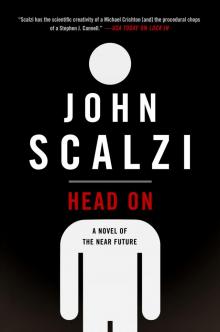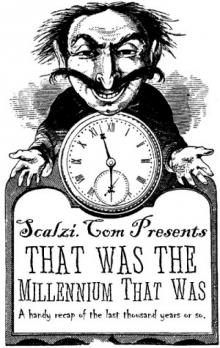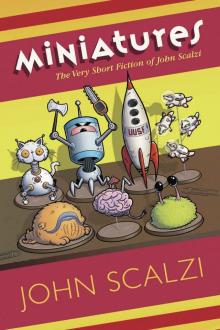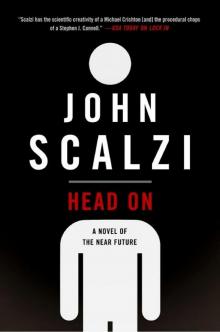- Home
- John Scalzi
THAT WAS THE MILLENIUM THAT WAS Page 3
THAT WAS THE MILLENIUM THAT WAS Read online
Page 3
Moving away from the mommy-whipping consequences of the book and turning to the actual contents, Somnium has some breathtaking leaps of intellect and imagination. When Kepler started work on Somnium, the heliocentric theory (the one that states that planets move around the sun instead of the earth) was still a zany and highly debatable idea, and the minutiae of gravity awaited Newton's Philosophiae Naturalis Principia Mathematica in 1687.
Into this scientific void, Kepler lept, and sketched out some tantalizing concepts: Zero gravity, space travel, extraterrestrial life (Somnium postulates a race of creatures living on the moon), the environs of space being cold and, if not airless, at least extremely air-poor. It's not a stretch to say that Kepler was the first person to think about these subjects in a manner that did not involve a late-night astronomer's BS session, fueled by pea-soup thick German beer ("Wow, what if there were, like, people on other planets, man?" "Shut up, Kepler! Wanna be burned at the stake like your mommy?").
This is perhaps also why, even today, some of the best science fiction writers are also scientists in their right, though admittedly, not of Kepler's caliber: Arthur C. Clarke and Issac Asimov, from the "Golden Age" of science fiction, folks like David Brin who are still writing. Like Kepler, these people are right on the precipice of human knowledge, staring out into the inky blackness and wondering what the hell is going on out there, anyway.
You may not have read Somnium, but Jules Verne and H.G. Wells sure did. They were in turn read by the Golden Era authors, who were read by this generation's writers, who will be read, barring the best attempts by the bookstores to sweep new science fiction from their shelves, by the next. Everyone who ponders and then writes about little green men, space travel and the infinite mysteries of space (including, dare I say, myself) share in the DNA of his or her imagination a small chromosomal link to Johannes Kepler, and his dream of a voyage from the earth to the moon. For someone who loves science and science fiction in equal amounts, this is a highly satisfying thought.
Best Crackpot Religious Leader of The Millennium.
Rasputin, and yes, I know, how can I choose Rasputin when L. Ron Hubbard is swinging there, fat and languid, like a low-hanging fruit? Well, for one thing, them Scientologists are a sue-happy bunch. In going after Rasputin, the only people I annoy are the Romanovs, and what are they going to do to me? They're all down a well in Russia.
Besides, unlike L. Ron and his merry band of celebrity-worshipping Thetans, Rasputin actually had power and influence, though not of any good sort. He was the wrong guy at the right place at the wrong time. At the beginning of the 20th Century, Imperial Russia was like a Jenga tower with one supporting strut too few. Rasputin didn't cause the Tsar to fall, but he sure helped to push.
Grigory Rasputin was his own walking warning label. The name "Rasputin," wasn't his name, it was his condition: in Russian, it means "debauched one," and it was given to him after he built up a reputation, at a young age, for being a horny little turd. You would think that being known as "Rasputin" would be a detrimental sort of thing -- I mean, just imagine trying to meet people here if your name was "Greg Pervert" -- but we're talking about Russia. If the last millennium teaches us anything about Russia, it is: For God's sake, don't get into a land war there. But secondarily, it teaches us that the Russians really aren't like the rest of us, and you can take that any way you like.
Rasputin experienced a religious conversion at the age of 18, which one could normally assume would have got him and his horndog ways sorted out. Au contraire. First, he joined a sect known as "Khlysty," which translates, roughly, as "the Flagellants." Not a good first step. Later he chose to pursue the closeness to God that only comes through what Rasputin described as "holy passionlessness," which could only be reached through sheer sexual exhaustion. Or, to put Rasputin's religious philosophy into bumper-sticker form: "Get Laid. See God." This provided Rasputin the theological rationale he needed to hump everything in sight.
Fast forward to 1903. Rasputin is the toast of the St. Petersburg movers and shakers, who, with that sort of spiritual dilettantism that inflicts the bored upper classes everywhere, regarded him the same way celebrities in the 60s regarded their swami, or regard their favorite motivational speaker today. Sure, Rasputin was illiterate and he only bathed once a month, but there sure was something about him (besides the stink).
Within a couple of years, Rasputin had found his way to the Tsar Nikolas II and Tsarina Alexandra, and he endeared himself to them by easing the pain of their hemophiliac son (historians think by a form of hypnosis). He also told them that his destiny was now tied to theirs; without him, they were doomed. The Tsar, never the world's most spineful person, kept him around.
This is when things got bad. By day, Rasputin was the Tsar's spiritual adviser; by night Rasputin wallowed in the orgy pit. People complained. The Tsar had them transferred to Siberia. Finally the Prime Minister presented the Tsar with a formal report on Rasputin's extracurricular activities. The Tsar booted Rasputin for a couple of months, but the Tsarina would have none of that. Rasputin was back, and the best the Tsar could do was shrug and regard Rasputin as his wife's hairy, scary, smelly pet.
World War I broke out, and the Tsar, perhaps wanting to feel like he actually was in charge of something, went to command the army in the field. The Tsarina was left to tend to internal affairs, and stop that snickering. Rasputin was in the background, advising the empress. His advice on political matters was just about as helpful as you might expect any advice coming from an ill-educated, over-sexed religious wacko might be. The Russian nobles, perhaps suspecting that the Proletariat Revolution was on its way and that Rasputin's "advice" wasn't going to do much to help the nobles keep their lands or their heads, decided to get Rasputin out of the way.
And thus it was in late December 1916 that Rasputin found himself at the home of Prince Feliks Yusupov, lured there by the promise that he'd meet someone's very attractive wife (no, really). They fed him poison in tea and in cakes. He gobbled it down and didn't blink. Then they shot him and cut off his instrument of theological enlightenment (no, not his brain. Yeesh). He managed to launch himself out the door. They shot him again, wrapped him in a carpet, and heaved his body into a river. At which point, of course, he died. Let's see you wiggle out of a wet carpet. But he was true to his word; the Romanovs and the rest of the nobility were all dead meat on a stick (in some cases literally) within a couple of years.
The moral of this particular story is, if you're ever the emperor of the largest country on earth, and a strange-looking monk comes by and offers to heal your hemophiliac son, run. Just run. No good will come of it. It's a valuable lesson for us all.
Best Historical Era of The Millennium (Excluding Our Own).
There isn't one. Uniformly and without exception, every single era before this one was pretty much the same from the standpoint of the average person. And the one we're living in now isn't one big happy basket of tropical fruit, either.
Now, let me amend this by saying that the current historical era is doing very well by me. I live in the wealthiest and most intellectually free country that has ever existed on this planet, surrounded by a dizzying array of astounding technical devices, ensconced in a domicile of surpassing comfort (it has cable!). I am overfed, overeducated, overpaid. My greatest physical need is to remember to blink because I stare at a glowing phosphor screen all day. I have all my teeth and limbs. I have to opportunity to bathe every day (and yes, I do just that, thank you very much).
Given the current state of technology -- and some not unreasonable expectations of where that technology is going -- it's not at all unlikely that I'll breeze past the 100-year-old mark. And my infant daughter, who as I write this is cheerfully chewing on a toy designed for maximum educational value, will have everything I have and more.
But, let's be very clear on this, I'm not the average citizen of this crowded, belching globe, and neither, for that matter, are you. If you have the ability to read this, you ar
e more or less like me: Living in a high-technology, high-protein, high-personal-expression zone. The trivia of your life vary from mine, of course, but basically you either are, or have endless opportunities to become, a big stinkin' capitalist pig.
The average human on this planet is not one of the 1% that is currently and blandly clicking his or her way through the Internet. As Kofi Annan is fond of reminding people, half of this planet's six billion human interlopers have never made or received a telephone call, much less are worried about installing a permanent DSL line into the home office. The average human on this planet is a dirt-poor farmer in China or India, and her life pretty much blows, compared to yours. And it's probably more accurate to say this: The median human on the planet is a dirt-poor farmer in China or India. Which means that underneath her, there's three billion people looking at her and wondering, why can't I have that life? Forget about your life. Your life isn't even on the table.
So, given: The average human's life on this ball of rock isn't a great big grab bag of joy. But also consider: The average life is still a hell of a lot better than it's ever been before. The average person doesn't have a tenth of what you or I have, but he or she has better medical care, better education and a better standard of living than his or her ancestors. Even more personal freedom, if you can believe that (but generally not by much). From this point, it's a simple equation. The present sucks for most people. It is still generally better than any other era before it. Conclusion: For the average Joe, any historical era was a bad era to be in, and the present's only marginally better.
Now, this doesn't mean these people were or are unhappy -- billionaires can be surrounded by every conceivable thing humans have ever thought of and be suicidal depressed, while someone squatting down and sticking a plant into a muddy bog of water can be happy as the proverbial clam. Most people who are not actively starving or being hoisted on an invader's pike are usually fairly content. But being happy doesn't mean the circumstances of your life don't reek.
The problem with history is that it's maybe one hundredth of one percent of what's going on in the world at any one point. History is rife with kings, queens, explorers and inventors. The bulk of the world's population at any time, however, is a bunch of schmoes planting crops and making horseshoes and typing code and asking you if you want fries with that. We see movement and advancement in the course of humanity's stay because we pick up individual events like seashells on the shore and string them together and call the necklace history. Meanwhile, the acres of sand at our feet stays the same.
"As it is now, so it was and evermore shall be" -- well, no, I don't really believe that. The average sad sack benefits from the technological and intellectual advances that make up the bulk of history, just not as much, or as often, as those of us at the top imagine (the flaw in the "trickle-down" theory is implicit in the title -- no one was ever satisfied by a "trickle" of anything). You can go to nearly every spot on the globe and see the vast majority of your brethren living essentially the same lives as their fathers, grandmothers, and ancestors, all the way back to beginning of the agricultural age, with only the occasional television or Bulls jersey thrown into to remind you that you're still here in the 20th Century.
Ask any of these people what historical era they feel it was best to live in, they'd probably look at you like you're nuts. They'd understand the question, of course. They just wouldn't know why you'd possibly think it applied to them.
Best Stupid Piece of Attire of the Millennium.
It's the necktie. Codpieces and drawstring pants come and go, but over the centuries, the necktie and its antecedents persist, hanging about a man's neck like a noose done in a four-in-hand. And unlike, say, the codpiece, which had at least an initial utilitarian purpose, the necktie has never been anything but a pointless strip of cloth, born to dangle and sway and wait for a use. Yank on one, you half expect a ticket to issue forth from the mouth of the wearer, to be validated when you buy some bit of Guatemalan handiwork from that Crate and Barrel down the street.
In fact, ties can be traced back, like so many pointless things, to the idle vanity of a king. And in this case, the king who knew more about idle vanity than any before or since: Louis XIV, the Sun King. Seems in 1660, Louis was reviewing a regiment of badass Croat soldiers, who wore brightly colored silk handkerchiefs around their necks. Why? Who knows? Maybe the Croats were worried they'd get separated at court and needed some conspicuous piece of clothing to locate each other later, like wayward second-graders on a field trip. Whatever the reason, Louis saw the regiment and their handkerchiefs, and just had to have one: A regiment of badasses, that is, not a handkerchief. He already had some of those.
So he got one, because who was going to tell Louis no, and he called them the "Royal Cravattes" ("cravatte" derived from "Croat" in French) and gave them fancy handkerchiefs for their necks. That was that. The King had spoken. Everyone started wearing ties. If it happened today, the badass Croats could probably sue for copyright infringement. But this was the 17th Century. What were you gonna do.
Men got stupid with the cravats. By the early 1800s, cravats were stuffed around the neck as if the head were being surrounded by tissue for transport in a box. Some guys couldn't move their necks at all; like whiplash victims or HR Pufnstuf, they had to rotate their whole bodies to look around. And some of these boys wore two cravats at the same time; one imagines they needed servants and a system of mirrors so they could navigate the street.
There were a hundred different ways to tie a cravat, some of which could take hours. Perhaps for this reason, fiddling with someone's cravat was a dueling offense, though think about it: If touching someone's tie was bad, how much worse it would be if you got blood on it? Fortunately, no one who would get worked up over a mussed cravat was likely to be missed once his cravat was further mussed by a sword point sticking through it into his carotid.
The best you can say about today's iteration of the necktie is that at least it's not aggressively stupid. One does not wear it wrapped around one's jaw, or more than one at a time. Even the horrifyingly wide ties in the 70s had a rational basis for their lateral expansion --they were merely keeping pace with the expanding lapels of the time. Mocking a 70s tie is purely a case of blaming the victim. They didn't want to go wide. They had no choice.
Be that as it may, it still doesn't take away from the fact that the tie does not now serve, nor has it ever served, any useful purpose. At least bell bottoms and Nehru jackets kept your extremities warm. Tie manufacturers would dispute this assessment of their products' usefulness, of course. But then, cigarette manufacturers used to pawn off their wares to pregnant women. No industry can be trusted to be an objective observer of its product's place in the universe -- particularly one that has a literal chokehold on the world of men's fashion.
Men simply do not realize that the tie is there at all their major life events. It's there when you graduate from high school and college. It's there at your wedding. It's there at your children's baptisms and bar mitzvahs. And when you die, they stick one on you and, like a pharaoh taking a prized but aggravating cat into the next world, you are both stuffed into the ground together (and the question is: Who is the pharaoh, and who is the aggravating cat?). The only reason men aren't born with ties is the grudging acknowledgement by the tie industry that looping the umbilicus into a Windsor knot around the neck of a fetus might cause brain damage. Which would limit tie purchases later in life.
Tie enthusiasts, the Quislings of men's attire, point out that ties allow for some individuality in an otherwise regimented world of men's business attire. But really, now. It's not individuality ties provide, it's the illusion thereof, and a poor one at that. Wear your Jerry Garcia tie all you want, you still have to file the same reports as Ted, three cubicles down, wearing his $6 poly blend from Sears. A Bugs Bunny tie will not keep the gun-toting ex-co-worker who just shot his way through Accounting from seeing you as any less of an extension of The Man That Kept Him Down. A ti
e with Edvard Munch's "The Scream" silk-screened upon its narrow width will not stop you from your dark suspicions that The New Guy makes twice what you do, with half the experience. And anyway, you wouldn't wear a single one of those ties to a performance review, so what does that say. Tie enthusiasts also point out that ties accentuate a man's verticality. Well, if you want to accentuate your verticality, go on a freakin' diet, already.
Men wear ties because so far as they know, men have always worn ties; it's what men do. If they knew that the tie got started as the passing fancy of the foppiest of the Great Kings of Europe, it probably wouldn't change a thing; the dress code is always dictated from above. Will they ever stop wearing them? Probably not. The best we can hope for is that ties don't start hampering neck movement again; and that if they do, we can somehow take out those tie wearers before they infect the rest of us. Their peripheral vision would be shot, you know. They would never see it coming.
Best Vision of Hell of the Millennium.
It comes from Hieronymus Bosch, the Dutch painter who lived in the 15th and 16th Centuries (although assuredly, not through them both entirely). Other people wrote about Hell, lectured about Hell, or simply feared it as the inevitable end to their sinful ways. Bosch saw Hell, like Walker Evans saw the Depression, and then reported on what he saw. It wasn't a very cheerful report, but then, what would you expect. Hell's not a resort filled with Payday bars and happy kittens. Unless you're allergic to nuts and cat dander. In which case, that's exactly what it is.

 Lock In
Lock In Clash of the Geeks
Clash of the Geeks Head On
Head On The Dog King
The Dog King Old Man's War Universe: Short Stories
Old Man's War Universe: Short Stories The End of All Things
The End of All Things Tales From the Clarke
Tales From the Clarke The Human Division
The Human Division The Android's Dream
The Android's Dream An Election
An Election Zoe's Tale
Zoe's Tale Agent to the Stars
Agent to the Stars This Hollow Union
This Hollow Union The Gentle Art of Cracking Heads
The Gentle Art of Cracking Heads Old Man's War
Old Man's War The Tale of the Wicked
The Tale of the Wicked Your Hate Mail Will Be Graded: A Decade of Whatever, 1998-2008
Your Hate Mail Will Be Graded: A Decade of Whatever, 1998-2008 Judge Sn Goes Golfing
Judge Sn Goes Golfing The Back Channel
The Back Channel The Human Division 0.5 - After the Coup
The Human Division 0.5 - After the Coup Fuzzy Nation
Fuzzy Nation The Observers
The Observers This Must Be the Place
This Must Be the Place The Last Colony
The Last Colony Unlocked: An Oral History of Haden's Syndrome
Unlocked: An Oral History of Haden's Syndrome A Voice in the Wilderness
A Voice in the Wilderness Redshirts
Redshirts The Collapsing Empire
The Collapsing Empire The Last Emperox
The Last Emperox The God Engines
The God Engines A Problem of Proportion
A Problem of Proportion THAT WAS THE MILLENIUM THAT WAS
THAT WAS THE MILLENIUM THAT WAS The B-Team
The B-Team The Sound of Rebellion
The Sound of Rebellion The President's Brain Is Missing
The President's Brain Is Missing Questions for a Soldier
Questions for a Soldier Walk the Plank
Walk the Plank We Only Need the Heads
We Only Need the Heads How I Proposed to My Wife: An Alien Sex Story
How I Proposed to My Wife: An Alien Sex Story Earth Below, Sky Above
Earth Below, Sky Above Everything but the Squeal
Everything but the Squeal Old Man’s War
Old Man’s War The Human Division #12: The Gentle Art of Cracking Heads
The Human Division #12: The Gentle Art of Cracking Heads This Must Be the Place thd-10
This Must Be the Place thd-10 A Voice in the Wilderness thd-4
A Voice in the Wilderness thd-4 The Observers thd-9
The Observers thd-9 The End of All Things: The Fourth Instalment
The End of All Things: The Fourth Instalment Earth Below, Sky Above thd-13
Earth Below, Sky Above thd-13 Zoe`s Tale вбиос-4
Zoe`s Tale вбиос-4 After the Coup
After the Coup Miniatures: The Very Short Fiction of John Scalzi
Miniatures: The Very Short Fiction of John Scalzi The Last Colony вбиос-3
The Last Colony вбиос-3 Tales From the Clarke thd-5
Tales From the Clarke thd-5 Old Man's War omw-1
Old Man's War omw-1 The Human Division #8: The Sound of Rebellion
The Human Division #8: The Sound of Rebellion The Ghost Brigades omw-2
The Ghost Brigades omw-2 The Sagan Diary (old man's war)
The Sagan Diary (old man's war) The Sound of Rebellion thd-8
The Sound of Rebellion thd-8 The Human Division 13 - Earth Below, Sky Above
The Human Division 13 - Earth Below, Sky Above Head On_A Novel of the Near Future
Head On_A Novel of the Near Future The End of All Things: The First Instalment
The End of All Things: The First Instalment The B-Team thd-1
The B-Team thd-1 The Back Channel thd-6
The Back Channel thd-6 Walk the Plank thd-2
Walk the Plank thd-2 The Human Division #9: The Observers
The Human Division #9: The Observers The End of All Things: The Third Instalment
The End of All Things: The Third Instalment The Human Division #10: This Must Be the Place
The Human Division #10: This Must Be the Place The End of All Things #2: This Hollow Union
The End of All Things #2: This Hollow Union We Only Need the Heads thd-3
We Only Need the Heads thd-3 Metatropolis
Metatropolis The Dog King thd-7
The Dog King thd-7 The Consuming Fire (The Interdependency)
The Consuming Fire (The Interdependency) The Human Division #11: A Problem of Proportion
The Human Division #11: A Problem of Proportion